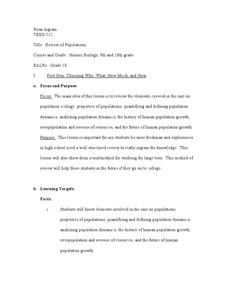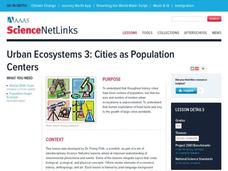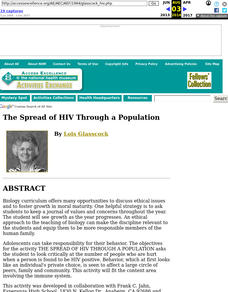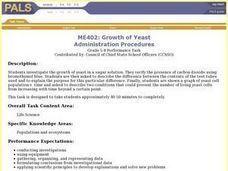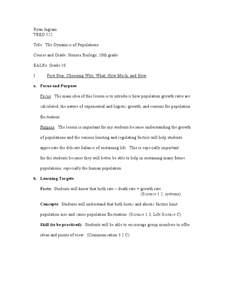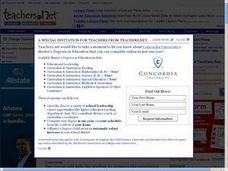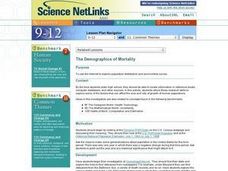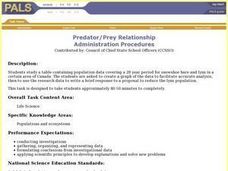Curated OER
The State of the Planet
Students address four different environmental topics (water issues, the threat of food shortages, human population growth, and global warming) as they watch a film and discuss the future of the earth. In groups, they complete various...
Curated OER
Review of Populations
Students review the concept of populations. In this Biology lesson plan, students will work with a partner to talk through what they remember from the unit on populations. The class will then begin to work through a concept map as a way...
Curated OER
Sustainable Marine Fisheries
Through a fishing simulation, environmentalists discover consequences of over fishing. Afterward, they discuss how the activity relates to the impact of real-life commercial fishing. They also consider sustainability in the fishing...
Curated OER
Urban Ecosystems 3: Cities as Population Centers
Students discover that throughout history cities have been centers of population but that human exploitation of fossil fuels was key to the growth of large cities worldwide. They research urban growth through a number of websites.
Curated OER
The Spread of HIV Through a Population
Students use a model to illustrate the spread of HIV through an adolescent population and, acting in the role of epidemiologists, explore the dilemmas of HIV infection presented by the simulation. beneficence and justice.
Curated OER
ME402: Growth of Yeast
Students investigate the growth of yeast in a sugar solution. They verify the pressure of carbon dioxide using bromothymol blue. Students are asked to describe the difference between the contents of the test tubes used and to explain...
Curated OER
Native Species Restoration and its Impact on Local Populations
Students explore how predators help control the growth of prey species for a more balanced ecosystem.
Curated OER
E. coli and Their Human Environment
Students are able to observe how environmental changes (antibiotics) affect the growth of E. coli. They are able to use the "F" test for statistical analysis. Students can explain that E. coli is a common rod-shaped intestinal...
Curated OER
The Dynamics of Populations
Tenth graders analyze the growth rate of different population. In this biology experiment, 10th graders identify the biotic and abiotic factors that limit population size. They create a poster to show their findings in class.
Curated OER
Regents High School Examination: Living Environment 2009
Emerging ecologists need a full understanding of life, from the inner workings of a cell to the complex relationships among organisms. This examination is meant to assess high schoolers after an entire year course on the living...
Curated OER
SC Populations Along Major Interstates
Students examine the population among the interstates in South Carolina. Using the internet, they identify the counties and roads and compare it with their own drawing.
Curated OER
On the Brink
Students view a film about environmental issues. They discover how environmental degradation can lead to disease. They identify the relationship between population growth and the environment.
Population Connection
A Demographically Divided World
Did you know that birth and life rates vary across the world? The resource, the second in a six-part series, discusses just how demographics differ across countries and why it might be the case. Scholars complete worksheets, watch...
Curated OER
Exploring Biomes Lesson 3: Endangered Biomes
Future environmental scientists compare data from two different conservation strategies. Alone this lesson is sufficient, but as part of the Exploring Biomes unit produced by the Arizona Fish and Game Department, it becomes top-notch.
Curated OER
Barefoot and Pregnant
Young scholars address the problem of a reduction in the world population growth rate being offset by a growing world population base. This problem is particularly true with the rapid population growth in many Third World countries. The...
Curated OER
The Demographics of Mortality
Students view the Dynamic POPClocks on the U.S. Census webpage and discuss their meaning. They explore age-related death rates of the human population and collect information about the deaths of humans and organize them into a life table.
Curated OER
Modeling Natural Disaster with Mathematical Functions
Ninth graders investigate the functional relationship of different environmental phenomena. For this math lesson, 9th graders create models of various natural disasters. They use logarithmic and exponential functions to interpret...
Curated OER
Cougar or Human: Which Needs Protection?
Students research the biology and natural history of the cougar. Students conduct Internet research to determine how cougars have been protected by humans and how it is affected by human decisions. Students write about reconciling...
Curated OER
Agriculture in the Desert
Students explore human migration. In this human migration lesson, students investigate multiple factors contributing to the growth of major Arizona cities. Students discover the processes, patterns, and functions of human settlement.
Curated OER
What Are We Going To Do About Baby Six Billion?
High schoolers formulate and evaluate suggestions about government policy using demographic examples and projections. They examine websites and utilize worksheets imbedded in this plan.
Curated OER
The Growth Of A City
Middle schoolers define what a city is. They investigate the top 10 - 15 most populated cities. SDescribe factors influencing the location and growth of urban sites. They site examples of cities that have grown with different models of...
Curated OER
Predator/Prey Relationship
Students study and analyze data collected on the relationship between the snowshoe hare and lynx in Canada over a 28 year period and create a graph. Students also write a response to a proposal to reduce the lynx population.
Curated OER
World Cities of 5 Million or More
Students consult online resources to identify and map the world's largest cities and metropolitan areas. They analyze birth rates, settlement patterns and other demographic data and make predictions for the future. They write essays...
Curated OER
Ecology: Factors Influencing Animal Populations
Young scholars assess the factors affecting animal populations. Working in groups they define specific vocabulary terms and complete several activities from "Project Wild."



